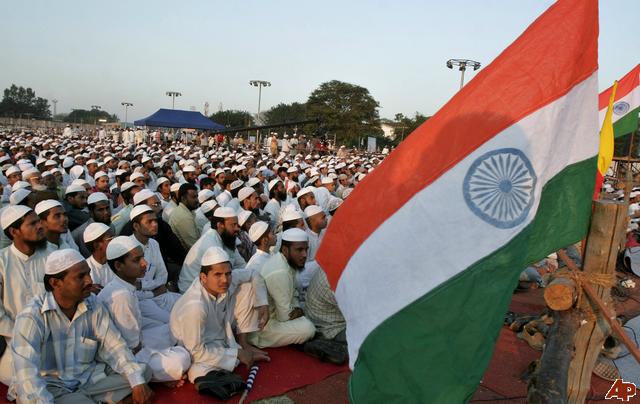
With the idea of making India a $5 trillion economy by 2026 and Hindutva ideology gaining momentum, concerns related to marginalized communities, in particular Muslims, have somewhat taken a backseat. With nearly 14.2% of the total population, the second-largest religious group of India is constituted of the Muslims. However, when one glances at the socio-demographic statistics in the fields of education, politics, and employment, the figures are abysmally disappointing.
Mahatma Gandhi once said, “The true measure of any society can be found in how it treats its most vulnerable members”. As per the Sachar Committee report, Muslims in India live with a sense of great fear and insecurity because of the communal riots and violence. It also showed how Muslims, on average, earned less than other groups and were more excluded from the financial world. As per a study by the National Sample Survey Office (NSSO), the average monthly per capita expenditure (MPCE) of a Hindu household was Rs 1,123 compared to Rs 980 of a Muslim household in the year 2009-10.
It is known that education is not only a key driver for economic growth but acts as a significant catalyst for empowerment. Unsurprisingly, the illiteracy rate in Muslims is higher than the national average. Particularly, the majority of Muslim women are illiterate, which is a case of grave concern. As per the 2014-15 All India Survey on Higher education, Muslims account for a meagre 4.4% of students enrolled in Higher education. Also, one of the reports published by The Economist states, “No serious official effort has been made to assess the lot of India’s Muslims since the publication in 2006 of a study ordered by Prime Minister Manmohan Singh”. However, television media rarely debates on such issues during prime time.
It is really appalling when the current ruling government makes horrifying comments against the minority, and the media never considers it important enough to discuss upon. This includes Uttar Pradesh Chief Minister, Yogi Adityanath, playing blame games in lynching cases instead of bringing stricter measures, and Amit Shah promising to expand NRC before the 2019 elections. Also, altering the names of different places, like Allahabad to Prayagraj, indicates to ulterior motives of the ruling government. This has instilled a sense of fear in the Muslims, and they feel that their heritage is being removed. Various research studies have suggested that as social, communal, and religious conflicts increase, the economic growth of a country gets severely hampered. An Australian headquartered think tank, the Institute for Economics and Peace (IEP), estimated a toll of $1,190 billion (approximately 8% of the GDP) in FY 2016-17 owing to communal and caste-based violence.
The founder of Banaras Hindu University, Pandit Madan Mohan Malaviya, once declared, “India is not a country of the Hindus only. It is a country of the Muslims, the Christians, and the Parsees too. The country can gain strength and develop itself only when the people of India live in mutual goodwill and harmony.” Therefore, even if India attains the $5 trillion mark with such inequality, would this growth be truly representative of the whole country or just a part of it?
Steps to improve the status of Muslims and bring equality
The problem needs to be solved from the ground-up by introducing reforms in education, employment, and politics. Fair representation across domains would increase the chances of active participation from the Muslim community in the Indian growth story.
The primary reform is required in the education sector. Working on the literacy rates of Muslims is the need of the hour. The importance of education and being literate cannot be stressed enough. For primary education, concerned authorities might start programmes, in Muslim dominated localities first and then on a larger scale, of informing the parents and generating awareness on the importance of education. This might be coupled with giving incentives such as free mid-day meals, school uniforms, and textbooks, among others. For higher education, reserving a portion of seats for the Muslims in the fields of medical, engineering, and management will encourage them and increase their representation in such domains. This might also help in curbing the drop-out rates.
The next meaningful reform should be brought into the employment sector. Financial freedom is the key to drive out of abject poverty. Marginalised groups like OBC and Dalits enjoy specific quotas. Bringing in some measures to increase the participation of Muslims in the employment sector will serve two-fold advantage. It will improve their current generations economically along with strengthening the financial base for the future ones. This might be coupled with the Skill India programme and include various vocational training for Muslims, which shall help in upliftment.
Political parties should encourage and give more party tickets to Muslims, not just for the vote bank politics but in the true spirit of inclusivity. This will lead to a fair representation of the Muslim community in the decision and policy-making processes. This is quite significant as the person who has experienced it, knows it better. As per Quartz India, although Muslims have always been underrepresented in the Lok Sabha, however, in 2014, it was at a 50-year low. The figure was 10% in the 1980s election, which plunged to a mere 4% in the 2014 elections.
Television media also needs to step up its game. Audio-visual media has a significant reach and impact on the audience. Media should take up such topics and discuss in their prime time with prominent politicians to reach a wider audience. This will help in increasing the awareness and sensitivity towards this concern.
One cannot alter yesterday but can certainly work on improving the future. Therefore, it is time that India paces towards the $5 trillion mark with much more inclusivity and fair representation of the marginalised sections of the society.
Raghav Gupta Pursuing Management at IIM Ahmedabad
SIGN UP FOR COUNTERCURRENTS DAILY NEWSLETTER











































